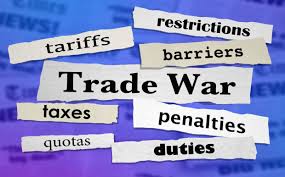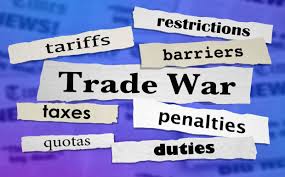
After the United States decided to extend the imposition of tariffs on steel and aluminum from the European Union, a comprehensive list of imported goods form the US, including lighters and plastic fittings for furniture, is being drawn up by the 128 member bloc hat will be levied with import duties in retaliation to the US tariffs on steel and aluminum.
The extension of the 25 per cent import tariffs on steel and 10 per cent on aluminum to derivative products, such as steel nails and aluminium cables, because of the import of such products were increasing from the EU was approved by US president Donald Trump in January.
Trump had excluded Argentina, Australia, Brazil, Canada, Mexico and South Korea from the tariffs which came into effect from February 8.
According to reports, the new tariff structure that is being proposed by the EU include a new 20 per cent tariffs on lighters and 7 per cent on plastic fittings for furniture, in addition to an additional 4.4 per cent tariffs on playing cards over a three years period. A 10 per cent tariff is already imposed on playing cards.
According to a spokesperson of the European Commission, the designing of the measures was such that they were proportionate and limited in scope. He added that the importance of maintaining open trade and supply chains was highlighted by the crisis.
“In order to assist the recovery, we expect our partners to remove any unlawful duties in place, including those on steel and aluminium,” the spokesperson said.
The World Trade Organization will now have to be informed of the plans of the European Union. Following that, it is expected that the new tariffs would come into effect from May which would allow a time period of one month for holding negotiations to work out a possible solution.
National security reasons were cited by Trump in 2018 when he had imposed import tariffs on steel and aluminum on a host of countries including the EU and other traditional trading partners of the US such as China and Japan.
The US tariff meant that the steel and aluminum producers of the EU needed to pay additional tariffs on exports of an annual 6.4 billion euros ($6.9 billion) worth of steel and aluminum products. The EU retaliated with tariffs of its own on US goods such as sweet corn, peanuts, bourbon, jeans and motor-bikes of the total worth of 2.8 billion euros.
The extension of the tariffs on steel and aluminum by Trump now impacts a smaller amount of about 40 million euros of EU exports to the US.
(Source:www.nytimes.com)
The extension of the 25 per cent import tariffs on steel and 10 per cent on aluminum to derivative products, such as steel nails and aluminium cables, because of the import of such products were increasing from the EU was approved by US president Donald Trump in January.
Trump had excluded Argentina, Australia, Brazil, Canada, Mexico and South Korea from the tariffs which came into effect from February 8.
According to reports, the new tariff structure that is being proposed by the EU include a new 20 per cent tariffs on lighters and 7 per cent on plastic fittings for furniture, in addition to an additional 4.4 per cent tariffs on playing cards over a three years period. A 10 per cent tariff is already imposed on playing cards.
According to a spokesperson of the European Commission, the designing of the measures was such that they were proportionate and limited in scope. He added that the importance of maintaining open trade and supply chains was highlighted by the crisis.
“In order to assist the recovery, we expect our partners to remove any unlawful duties in place, including those on steel and aluminium,” the spokesperson said.
The World Trade Organization will now have to be informed of the plans of the European Union. Following that, it is expected that the new tariffs would come into effect from May which would allow a time period of one month for holding negotiations to work out a possible solution.
National security reasons were cited by Trump in 2018 when he had imposed import tariffs on steel and aluminum on a host of countries including the EU and other traditional trading partners of the US such as China and Japan.
The US tariff meant that the steel and aluminum producers of the EU needed to pay additional tariffs on exports of an annual 6.4 billion euros ($6.9 billion) worth of steel and aluminum products. The EU retaliated with tariffs of its own on US goods such as sweet corn, peanuts, bourbon, jeans and motor-bikes of the total worth of 2.8 billion euros.
The extension of the tariffs on steel and aluminum by Trump now impacts a smaller amount of about 40 million euros of EU exports to the US.
(Source:www.nytimes.com)





